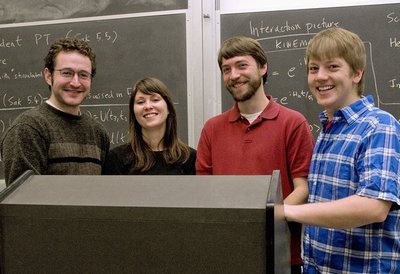March 4, 2010
Engage Speaker Series: Where science meets storytelling
For scientists, the research always comes first. But it’s also good to know how to communicate that research to nonscientists. That’s why a few graduate students created Engage: The Science Speaker Series.
The Engage series gives graduate students in science a chance to describe their research in plain language to general audiences — with a minimum of jargon and an emphasis on narrative. It’s science meeting storytelling.
The series started Jan. 13 and continues through May. The lectures are at 7 p.m. every other Wednesday in the Physics-Astronomy Auditorium.
The four graduate students organizing the series are Eric Hilton, Phil Rosenfield and Cliff Johnson of astronomy and Rachel Mitchell from forest resources. What they started this quarter in pilot project form as a lecture series they hope to offer in the fall as a seminar.
It’s not that academics are inherently bad at plain speaking, said Hilton, “but you never really spend time thinking how to do it well.” He said, “When you come to graduate school they teach you to be a rigorous scientist, but you spend almost zero time thinking about how to communicate to the general public.”
Hilton said the four got the idea for the series when they were in the Graduate School’s Forum on Science, Ethics and Policy. “We were reading some books talking about problems with scientific literacy and the need for better public understanding of science, and thought we should do something about this.” The book that most motivated them, Hilton said, was called Don’t Be Such a Scientist, by Randy Olson, a scientist who quit academia to become a California filmmaker.
Hilton said they encourage speakers “to start thinking about telling your research as a story, which is what most people are geared to enjoy and understand. Whereas if you start to lecture, that’s interesting for about five minutes.” The approach makes sense, he said, because there’s already a lot of drama and conflict inherent in science’s quest for the unknown.
Colleague Rachel Mitchell said explaining science more simply to nonscientists can also help debunk the stereotypical view the mainstream media promotes of scientists as “ivory tower intellectuals.” She said, “It’s important to let people know what exactly scientists do for a living and how they feel about their work.”
The first four Engage speakers were the four organizers themselves. Rosenfield kicked the series off with a presentation called Learning About Stars from Hubble’s Views of Galaxies; followed by Hilton speaking on Big Flares on Little Stars. Mitchell came next; her title was Weeds are More Than Plants Out of Place: Mechanisms of Plant Invasion. Johnson followed with a presentation on Galaxies in a Different Light: Astronomy in X-rays, Optical, IR, and Radio.
The next lecture will be Big Bang to an Immigrant Sun: The Birth and Life of Spiral Galaxies on March 10, presented by astronomy graduate student Rok Roskar. On March 17 (changing briefly the every-other-week schedule), Charlotte Christensen, also a graduate student in astronomy, will present Galactic Gas: Simulating Stellar Birthplaces.
Hilton said being able to describe science plainly is also helpful when pursuing grant funds. “When you’re writing a proposal or application for funds you’re talking not to your scientific peers but to people at foundations who are not necessarily scientists,” he said. “Having these skills can be very valuable.”
The four have created a Web site about the Engage series that will eventually include YouTube videos of previous presentations. Find it online here. You can also follow the series on Facebook.
Hilton said they’re also hoping to bring in some guest speakers “who are really good communicators, to come in and talk about what they do.” He said he hopes the project spreads to include representatives of science research campuswide.
After all, as Mitchell said, “It isn’t coveted knowledge we hide from the public.”

